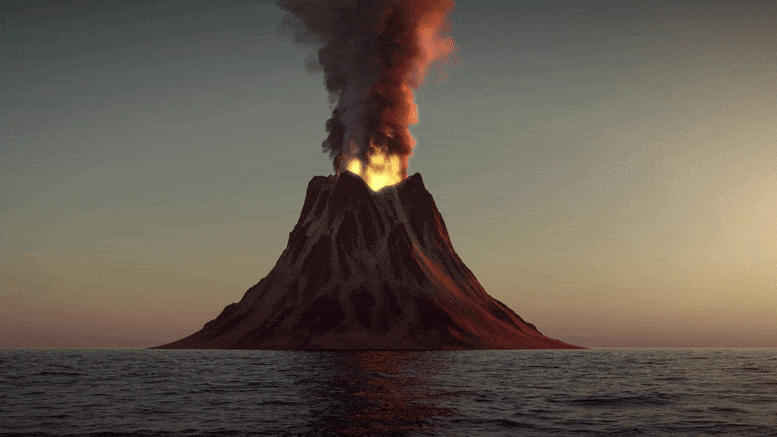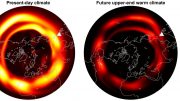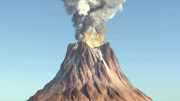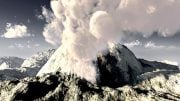
A study led by the University of Cambridge suggests that the cooling effect of volcanic eruptions on Earth’s surface temperature is likely underestimated in standard climate projections, possibly by up to four times. The researchers discovered that small-magnitude eruptions, which occur more frequently than large ones, contribute significantly to volcanic cooling effects by emitting sulphur gases into the atmosphere, highlighting the need for improved representation of all volcanic activities in climate modeling.
Scientists have discovered that standard climate predictions may undervalue the surface temperature cooling effect of volcanic eruptions by a multiple of two, possibly even four.
Despite this, the effect is not substantial enough to counterbalance the global temperature increase triggered by human actions. Led by the University of Cambridge, the team of researchers propose that eruptions of smaller magnitude could be accountable for up to half of all sulfur gases that volcanoes release into the upper atmosphere.
The results, reported in the journal Geophysical Research Letters, suggest that improving the representation of volcanic eruptions of all magnitudes will in turn make climate projections more robust.
Where and when a volcano erupts is not something that humans can control, but volcanoes do play an important role in the global climate system. When volcanoes erupt, they can spew sulfur gases into the upper atmosphere, which form tiny particles called aerosols that reflect sunlight back into space. For very large eruptions, such as Mount Pinatubo in 1991, the volume of volcanic aerosols is so large that it single-handedly causes global temperatures to drop.
However, these large eruptions only happen a handful of times per century – most small-magnitude eruptions happen every year or two.
“Compared with the greenhouse gases emitted by human activity, the effect that volcanoes have on the global climate is relatively minor, but it’s important that we include them in climate models, in order to accurately assess temperature changes in the future,” said first author May Chim, a Ph.D. candidate in the Yusuf Hamied Department of Chemistry.
Standard climate projections, such as the Intergovernmental Panel on Climate Change (IPCC) Sixth Assessment Report, assume that explosive volcanic activity over 2015–2100 will be at the same level as the 1850–2014 period, and overlook the effects of small-magnitude eruptions.
“These projections mostly rely on ice cores to estimate how volcanoes might affect the climate, but smaller eruptions are too small to be detected in ice-core records,” said Chim. “We wanted to make a better use of satellite data to fill the gap and account for eruptions of all magnitudes.”
Using the latest ice-core and satellite records, Chim and her colleagues from the University of Exeter, the German Aerospace Center (DLR), the Ludwig-Maximilians University of Munich, Durham University, and the UK Met Office, generated 1000 different scenarios of future volcanic activity. They selected scenarios representing lower, median, and high levels of volcanic activity, and then performed climate simulations using the UK Earth System Model.
Their simulations show that the impacts of volcanic eruptions on climate, including global surface temperature, sea level, and sea ice extent, are underestimated because current climate projections largely underestimate the plausible future level of volcanic activity.
For the median future scenario, they found that the effect of volcanoes on the atmosphere, known as volcanic forcing, is being underestimated in climate projections by as much as 50%, due in large part to the effect of small-magnitude eruptions.
“We found that not only is volcanic forcing being underestimated, but small-magnitude eruptions are actually responsible for as much as half of the volcanic forcing,” said Chim. “These small-magnitude eruptions may not have a measurable effect individually, but collectively, their effect is significant.
“I was surprised to see just how important these small-magnitude eruptions are – we knew they had an effect, but we didn’t know it was so large.”
Although the cooling effect of volcanoes is being underestimated in climate projections, the researchers stress that it does not compare with human-generated carbon emissions.
“Volcanic aerosols in the upper atmosphere typically stay in the atmosphere for a year or two, whereas carbon dioxide stays in the atmosphere for much, much longer,” said Chim. “Even if we had a period of extraordinarily high volcanic activity, our simulations show that it wouldn’t be enough to stop global warming. It’s like a passing cloud on a hot, sunny day: the cooling effect is only temporary.”
The researchers say that fully accounting for the effect of volcanoes can help make climate projections more robust. They are now using their simulations to investigate whether future volcanic activity could threaten the recovery of the Antarctic ozone hole, and in turn, maintain a relatively high level of harmful ultraviolet radiation at the Earth’s surface.
Reference: “Climate Projections Very Likely Underestimate Future Volcanic Forcing and Its Climatic Effects” by Man Mei Chim, Thomas J. Aubry, Nathan Luke Abraham, Lauren Marshall, Jane Mulcahy, Jeremy Walton and Anja Schmidt, 13 June 2023, Geophysical Research Letters.
DOI: 10.1029/2023GL103743
The research was supported in part by the Croucher Foundation and The Cambridge Commonwealth, European & International Trust, the European Union, and the Natural Environment Research Council (NERC), part of UK Research and Innovation (UKRI).









There is so much certainty in this article about climate change repeated every few sentences, while the story is that they’ve been underestimating the climate effect of volcanic eruptions by maybe 4x. Just to put that in perspective, if you think I’m around 50, with that same climate error rate, I’m now 200 years old. Are they afraid someone is going to beat them up if they admit to the slightest uncertainty about climate change?
No, it’s like estimating how long it takes to dismiss your existence completely based on your total understanding of relative concepts of scales. It took me maybe 1-4 seconds. If I guessed it’s 1 and it’s actually 4, you’re still insignificant and stupid.
Alright, so you were 300% wrong.
When it comes to scale, considering the enormity of Earth’s climate, the existence of every one of us is completely insignificant. Regarding our total understanding of climate change, we are all stupid. That’s actually my point challenging certainty, and you’ve illustrated it perfectly. So, thanks, but you’ve misspelled “Bothred”.
Other than insulting Hottan and trying to establish your superiority over him, just what point are you trying to make, if any?
It’s alright. Uncertainty is a hard truth to cope with, and ad hominem insults are a last resort. I might be able to make urbotheredbecauseurdumb’s argument better. It’s absurd that I should be 200, because people don’t live that long. The effect of volcanoes on the climate could be an order of magnitude more or less without absurdity. Therefore, the scale in my example is awkward that way. Of course, I’d argue that one person living to 200 would be a popular news story yet still quite insignificant. A dull arithmetic error in estimation on a global scale like this is so enormous, in terajoules of solar energy per day affecting everyone, that by comparison if they also estimated I was 200 we could just call that rounding-up.
I’m glad they’re doing this research, correcting errors. I was hard on the press-release writer and whoever they’re appeasing, but it’s hard to say anything against the narrative. Maybe studying any cooling effects could threaten grant funding, so maybe it takes a special courage I don’t understand, but I would like to know how.
“Although the cooling effect of volcanoes is being underestimated in climate projections, the researchers stress that it does not compare with human-generated carbon emissions.”
The unstated assumption is that the recent volcanic activity rate will continue at least for as far into the future as projections are being made. That may not be a reasonable assumption. Volcanoes are notoriously episodic, often with long periods of quiescence or dormancy, punctuated with shorter periods of eruptive activity. However, the ends of several geologic epochs are characterized by long, intense volcanic activity. The difference is so great that it has been remarked that civilization, as we know it, would be impossible during one of the more active periods. There is no way to predict when such events might occur. However, for those in the business of modeling climate, they need to either hedge their bets by prefacing their predictions with “assuming volcanic activity continues as it has been in recent years,” and/or widen their uncertainty envelopes. Inasmuch as this article, and another similar one [ https://scitechdaily.com/warming-hiatus-caused-part-small-volcanic-eruptions/?expand_article=1 ], have acknowledged that the impact of even small eruptions are not being characterized properly, and it is known that the Holocene epoch is not representative of past periods of volcanism, modelers do need to formally take these concerns into consideration.
It’s a good point about a major uncertainty. Discovery & BBC did a great documentary-drama in 2005 called Supervolcano. It’s a disaster flick, but in a science-friendly way it visualizes how quickly an eruption can change the climate. A VEI-8 eruption obviously would and for centuries, but the times you mention in the geological record of dramatic vulcanism would change the climate calculus completely. With our technology it’s an impossible variable to project for, so the climate models just go ceteris-paribus assuming it’ll not change in order get any conclusion, even if we know it must change eventually.